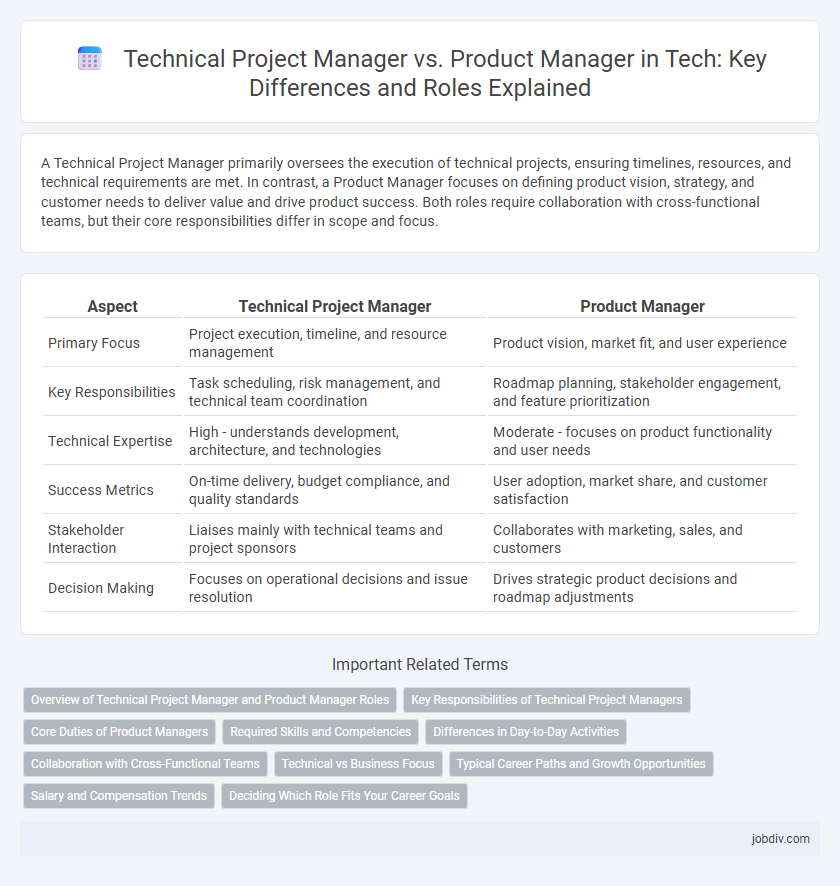A Technical Project Manager primarily oversees the execution of technical projects, ensuring timelines, resources, and technical requirements are met. In contrast, a Product Manager focuses on defining product vision, strategy, and customer needs to deliver value and drive product success. Both roles require collaboration with cross-functional teams, but their core responsibilities differ in scope and focus.
Table of Comparison
| Aspect | Technical Project Manager | Product Manager |
|---|---|---|
| Primary Focus | Project execution, timeline, and resource management | Product vision, market fit, and user experience |
| Key Responsibilities | Task scheduling, risk management, and technical team coordination | Roadmap planning, stakeholder engagement, and feature prioritization |
| Technical Expertise | High - understands development, architecture, and technologies | Moderate - focuses on product functionality and user needs |
| Success Metrics | On-time delivery, budget compliance, and quality standards | User adoption, market share, and customer satisfaction |
| Stakeholder Interaction | Liaises mainly with technical teams and project sponsors | Collaborates with marketing, sales, and customers |
| Decision Making | Focuses on operational decisions and issue resolution | Drives strategic product decisions and roadmap adjustments |
Overview of Technical Project Manager and Product Manager Roles
Technical Project Managers oversee the planning, execution, and delivery of technology-focused projects, ensuring timelines, budgets, and technical specifications are met. Product Managers drive the vision, strategy, and lifecycle of a product, focusing on customer needs, market trends, and cross-functional collaboration to maximize product value. Both roles require strong leadership and communication skills but differ in scope, with Technical Project Managers managing project execution and Product Managers steering product direction.
Key Responsibilities of Technical Project Managers
Technical Project Managers oversee the planning, execution, and delivery of technology-focused projects, ensuring alignment with business goals and technical specifications. They manage cross-functional teams, coordinate resources, mitigate risks, and maintain project timelines and budgets through effective communication and agile methodologies. Their responsibilities include defining project scope, tracking progress using tools like Jira or Microsoft Project, and facilitating technical problem-solving to achieve successful project outcomes.
Core Duties of Product Managers
Product Managers drive product vision, strategy, and roadmap development to align with market needs and business goals. They prioritize features based on customer feedback, competitive analysis, and cross-functional collaboration with engineering, marketing, and sales teams. Managing product lifecycle from ideation to launch and post-launch optimization ensures continuous value delivery and customer satisfaction.
Required Skills and Competencies
Technical Project Managers require expertise in project planning, risk management, and resource allocation to ensure deliverables meet time and budget constraints, emphasizing skills in Agile methodologies, technical communication, and stakeholder coordination. Product Managers focus on market analysis, user experience design, and strategic product vision, necessitating competencies in customer insights, roadmap prioritization, and cross-functional team leadership. Both roles demand strong problem-solving abilities and technical literacy but differ in their orientation: execution and delivery for Technical Project Managers versus innovation and growth for Product Managers.
Differences in Day-to-Day Activities
Technical Project Managers prioritize overseeing project timelines, resource allocation, and risk management, ensuring technical teams adhere to development schedules and deliverables. Product Managers focus on defining product vision, gathering customer requirements, and aligning features with market needs to drive product success and user satisfaction. While Project Managers handle execution and coordination, Product Managers concentrate on strategy, roadmap planning, and stakeholder communication.
Collaboration with Cross-Functional Teams
Technical Project Managers coordinate cross-functional teams by managing timelines, resources, and technical dependencies to ensure project delivery aligns with business goals. Product Managers collaborate with design, marketing, engineering, and sales teams to define product vision, prioritize features, and drive user-centric development. Both roles require effective communication and alignment to facilitate seamless cooperation across departments and achieve project success.
Technical vs Business Focus
Technical Project Managers excel in overseeing software development lifecycles, managing technical teams, and ensuring system architecture aligns with project requirements, emphasizing technical execution and resource allocation. Product Managers concentrate on market analysis, customer needs, and product vision, driving business strategy and prioritizing features that maximize market impact and revenue. The Technical Project Manager's role centers on technology delivery and operational efficiency, while the Product Manager balances technical feasibility with business objectives to optimize product success.
Typical Career Paths and Growth Opportunities
Technical Project Managers often advance by deepening expertise in project delivery methodologies and moving into roles such as Program Manager or PMO Director, focusing on cross-functional coordination and strategic execution. Product Managers typically progress by expanding product ownership responsibilities, evolving into Senior Product Manager, Group Product Manager, or Chief Product Officer roles, emphasizing market strategy and user experience optimization. Both career paths offer growth through leadership roles, but Technical Project Managers align more with operational efficiency while Product Managers drive product vision and business outcomes.
Salary and Compensation Trends
Technical Project Managers typically command salaries ranging from $90,000 to $130,000 annually, with compensation influenced by industry and project complexity. Product Managers often earn between $100,000 and $150,000 per year, with higher earning potential linked to product lifecycle responsibility and market impact. Salary trends reveal increasing demand for both roles, with Product Managers experiencing faster growth driven by strategic decision-making and revenue outcomes.
Deciding Which Role Fits Your Career Goals
Technical Project Managers focus on overseeing project execution, coordinating cross-functional teams, and ensuring delivery timelines aligned with technical specifications. Product Managers prioritize defining product vision, gathering market requirements, and driving product strategy to maximize user value and business impact. Choosing between these roles depends on whether your career goals emphasize operational leadership and process management or strategic product innovation and customer-centric development.
Technical Project Manager vs Product Manager Infographic

 jobdiv.com
jobdiv.com